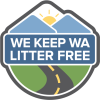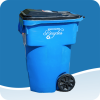Leftover household products that are flammable, reactive, corrosive, or toxic are considered household hazardous waste (HHW). To prevent serious injury, illness, damage to property, and harm to the environment, these items require special disposal. Never put HHW in your garbage or recycling carts, down the drain or into the storm drain.
HHW transfer station disposal locations
Residents can self-haul HHW for free disposal at drop-off locations at the transfer stations during select hours . If choosing to self-haul, keep in mind that to prevent litter and injury, the state of Washington and local ordinances require all loads being hauled to be secured and covered. Department of Ecology offers additional information including tips to secure your load.
All HHW drop-off locations require the visitor to fill out a short form (name, address, and signature verifying the waste is not generated from a business).
HHW drop-offs are limited to 25 gallons or 200 pounds per visit. (Exception: nicotine/vaping products are limited to 1 gallon per visit.)
Alternative drop-off locations
In addition to the HHW drop-off locations at the transfer stations, there are many alternative locations to dispose of common hazardous items like paint, batteries, medications, and more.
To look up specific materials and learn how to prepare and properly dispose of them, use the Recycling A-Z Directory or download the RecycleRight app.
Battery drop-off locations
In 2023, Clark County partnered with Waste Connections of Washington to provide residents with convenient drop-off locations for no-cost battery recycling. This program aims to reduce the risk of fires and explosion from batteries being improperly put in garbage or recycling carts.
Nicotine vapes disposal
Nicotine vapes are growing in popularity, which has led to a new household hazardous waste concern. Nicotine is extremely poisonous and extra nicotine liquid should be disposed of frequently. The batteries in nicotine vapes are also harmful if not properly discarded. Follow these guidelines for safe disposal.
Contact information
Solid Waste Operations
Solid Waste Education & Outreach
564.397.7352
Email
RecycleRight tool
Download the RecycleRight app (available on Apple and Android devices):
- View collection schedule.
- Sign up for reminders and service alerts.
- Look up donation, recycle and disposal options with the Recycling A-Z directory.
Green Neighbors
For more information on safe disposal and ideas for reducing household hazardous wastes in your home, check out the resources available through the Green Neighbors program. Green Neighbors connects Clark County residents with ways to live sustainably and reduce their impact on our natural world.
Sign up for the Green Neighbors newsletter to keep informed on current programs and outreach efforts.




